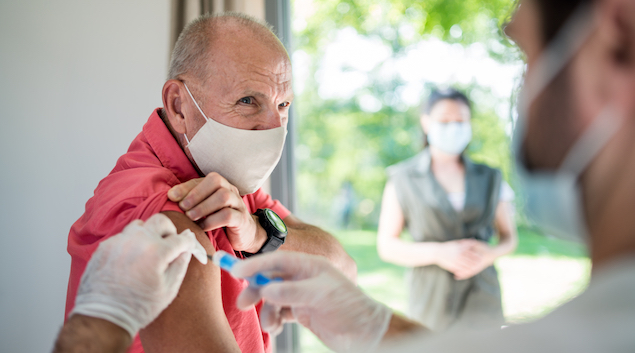Photo: Henry Ford Health System
Detroit-based Henry Ford Health System is gearing up to offer hospital-level care in the home setting, thanks to a new partnership with Contessa.
The partnership will offer a number of home healthcare options, including acute care services, skilled nursing care and palliative care.
Under the Hospital at Home program, eligible patients can choose to receive the same care they’d get at the hospital in their home through a combination of virtual and in-person services. The same is true for Henry Ford’s Skilled Nursing Care at Home and Palliative Care at Home programs, which offer additional emotional support for people living with serious illnesses.
The health system is first rolling the program out at Henry Ford Hospital in December and is planning to expand to other Henry Ford hospital locations in the future, according to the announcement.
Contessa has made a name for itself providing home healthcare through its Care Convergence platform that offers risk-based-model and claims analytics capabilities. The company is already partnering with a number of health systems, and payers including Mount Sinai Health System, CommonSpirit Health, Marshfield Clinic Health System and Highmark Health.
Contessa’s care model boasts outcomes such as a 44% reduction in readmissions, a 35% decrease in the average length of stay and a 90% patient satisfaction score.
“Henry Ford Health System is committed to putting its patients at the center of its care delivery, and Henry Ford Hospital Care at Home is a natural extension of that passion,” Contessa CEO Travis Messina said in a statement. “This model personalizes care for acute and chronic conditions, while lowering costs and increasing patient satisfaction. Contessa is honored to partner with Henry Ford to bring this level of care to the people of Michigan.”
WHY THIS MATTERS
While hospitals have historically been the primary location of acute care services, new models of care are triggering a paradigm shift.
In fact, home hospital care proved to outpace traditional hospital care in a number of areas in a pilot study conducted by Brigham and Women’s Hospital. Not only did home healthcare cut average costs of care in half, but it also decreased utilization and improved physical activity, without appreciably changing quality, safety or patient experience. The study also noted that patients appreciated being in their homes surrounded by family, eating their own food and sleeping in their own beds.
Especially during the COVID-19 pandemic, at-home healthcare has been a welcome alternative for patients who would’ve otherwise delayed receiving care. For example, 54% and 43% of consumers respectively said they would delay care over fears of contracting COVID-19 or going to the hospital, according to a Kaufman Hall survey.
COVID-19 originally drove Hospital at Home for acute care at UMass Memorial Health, but the benefits of the program will ensure its continuation post-pandemic.
“That’s another significant long-term impact to the pandemic, thinking about how we can move as much care out of the hospital,” said Dr. Michael Gustafson, president, UMass Memorial Health, speaking to Healthcare Finance News in July. “Moving inpatient surgery to outpatient for example. We’re going all out in our Hospital at Home program, in part because we think it’s so much better care for patients.”
Wright Lassiter, III, president and CEO of Henry Ford Health System said in a statement, “There has never been a more important time for us to partner with our patients and members along their entire healthcare journey and to give them the choices they want and need. We are excited to partner with Contessa for this opportunity to build on our strong foundation of home health care and further integrate the care and coverage we provide to improve the experience and the outcomes our customers deserve.”
THE LARGER TREND
Earlier this year, Contessa was bought up by home healthcare company Amedisys.
At-home hospital care has become more popular ever since the Centers for Medicare and Medicaid Services issued pandemic-related flexibilities for a number of health systems.
Since then, Humana announced plans to acquire One Homecare Solutions, or onehome, in an effort to grow its presence in the value-based home healthcare space. That followed the insurer’s move to purchase the remaining share of Kindred at Home.
Additionally, both Mayo Clinic and Kaiser Permanente utilize Medically Home Group’s at-home acute care services. The two health systems invested $100 million in the company earlier this year.
Twitter: @HackettMallory
Email the writer: mhackett@himss.org











